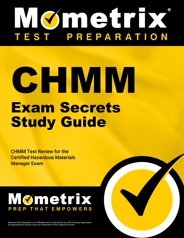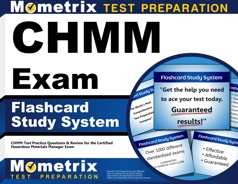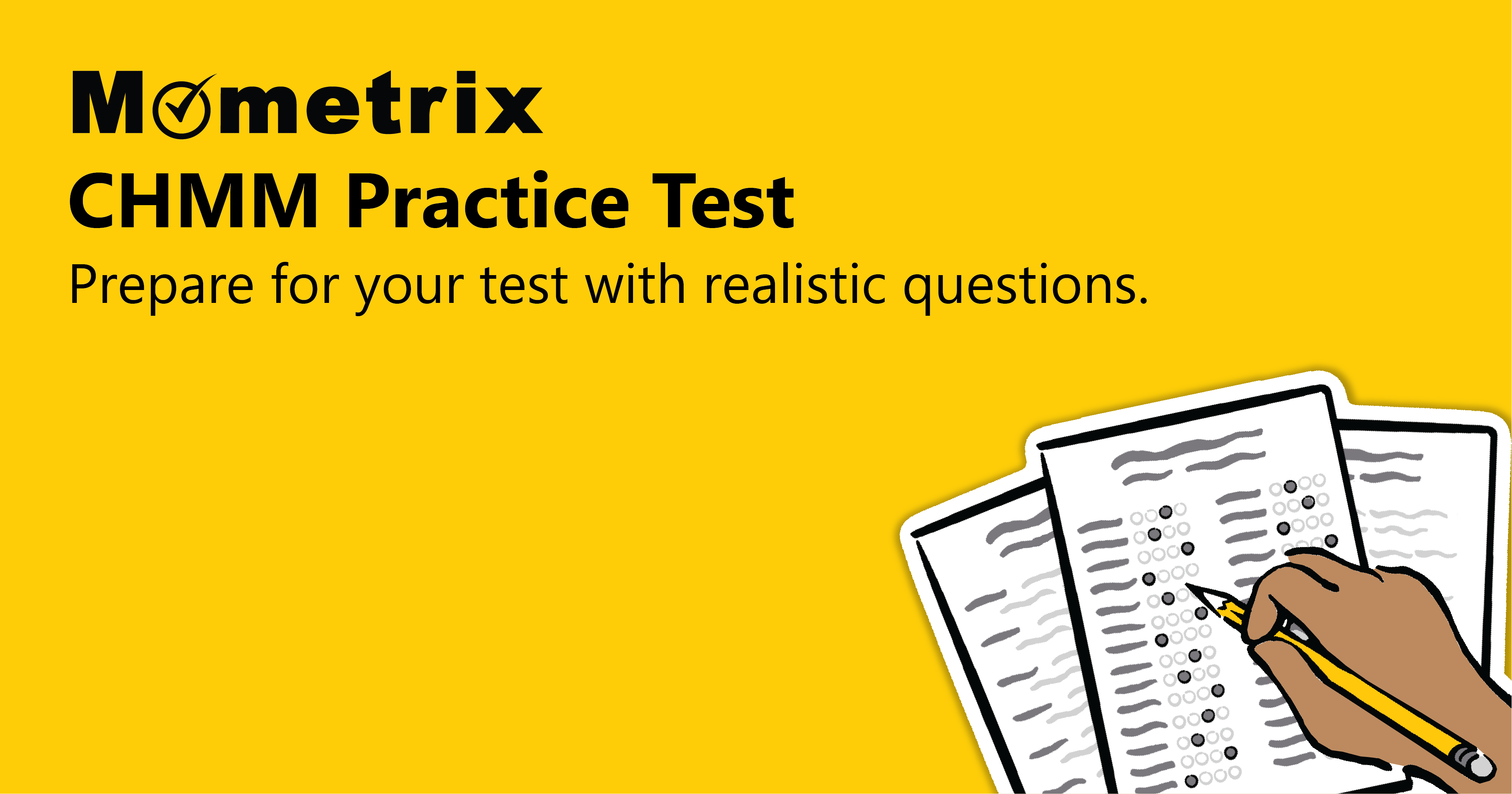The Certified Hazardous Materials Manager (CHMM) exam evaluates candidates seeking professional certification in the field of hazardous materials management. The examination is designed to evaluate a candidate’s knowledge of concepts, regulations, and practices of hazardous materials management.
Click “Start Test” above to take a free CHMM practice test!
Exam Eligibility
To be eligible for the exam, you must meet both of the following requirements:
- You must hold at least a baccalaureate degree with a noted preference for the sciences, hazardous materials management, environmental technology, or environmental management
- You must have at least four years of relevant experience in hazardous materials management or some related field
CHMM Exam Outline
The CHMM exam contains 140 multiple-choice questions, and you will be given a 3-hour time limit.
The exam is split into 12 content domains, and each domain contains a set of tasks.
1. Planning for Materials with Hazards (10.71%)
The questions in this section are designed to assess your knowledge and abilities related to effective recycling, identification of hazardous materials, pollution prevention, and more.
Tasks
- Identify hazardous materials
- Identify examples of effective recycling
- Identify the impact of given hazardous materials and processes on water resources, air, and soil
- Identify the characteristics of minor and major permits
- Identify components of the Standard Operating Procedures (SOP)
- Identify the elements and sequence of events in a given scenario about a PPOA
- Identify the pollution impacts and related regulations given a scenario involving pollution
- Determine the threshold quantity of a regulated substance
- Identify preferred pollution prevention strategies
2. Shipping and Transporting Hazardous Waste and Hazardous Materials (10%)
The questions in this section are designed to assess your knowledge and abilities related to shipping hazardous materials, shipment placarding, and more.
Tasks
- Determine how hazardous materials should be marked in a given scenario involving shipping
- Identify the requirements of hazmat transportation
- Identify conditions under which shipments can be accepted or rejected
- Identify the appropriate containers for packaging given items
- Identify what information should be included in shipping documents
- Identify required placarding
- Identify the labeling required for shipments of hazardous waste
3. Store Materials with Hazard (9.29%)
The questions in this section are designed to assess your knowledge and abilities related to labeling requirements, storage requirements, and more.
Tasks
- Identify how to control access to hazardous materials
- Identify regulations that apply to specific inventory
- Identify how storage meets requirements
- Identify requirements for property containing hazardous waste
- Identify proper container labeling requirements
4. Facility Operations Involving Materials with Hazards (9.29%)
The questions in this section are designed to assess your knowledge and abilities related to PPE, disposal of hazardous waste, and more.
Tasks
- Identify engineering controls that should be used to treat, store, and dispose of hazardous waste
- Identify testing procedures needed to determine the hazard of a given material
- Identify the PPE that would be used when handling a given hazardous material
- Identify regulatory training record requirements
- Identify the hazardous communication requirements needed for a given material
- Determine health, safety, and security requirements given a hazardous material
5. Disposition of Materials with Hazards (8.57%)
The questions in this section are designed to assess your knowledge and abilities related to emissions, discharges, final disposition, and more.
Tasks
- Identify how the release from a container should be managed
- Identify what a generator uses to qualify at a disposal facility
- Identify how final disposition is confirmed and documented
- Identify typical waste profile components
- Identify disposition options for a given waste material
- Identify how emissions and discharges should be managed
6. Record Keeping and Reporting (6.43%)
The questions in this section are designed to assess your knowledge and abilities related to reporting hazardous spills and recordkeeping requirements.
Tasks
- Identify the reporting requirements of a hazardous spill
- Identify the recordkeeping requirements for the relevant regulatory program
7. Training Personnel (7.86%)
The questions in this section are designed to assess your knowledge and abilities related to job training, assessments, and more.
Tasks
- Identify the types of required training for a specific job
- Determine the adequacy of training content and its duration
- Identify the competencies needed for a given activity involving hazardous materials
- Identify which types of agencies should be involved in a Hazmat event
- Identify the assessment that should be used in a given scenario about training
8. Response and Recovery (7.86%)
The questions in this section are designed to assess your knowledge and abilities related to incident reporting, chemical hazards, and more.
Tasks
- Identify the conditions that require a given incident to be reported to the NRC
- Identify the data needed to investigate the cause of a given incident
- Identify chemical and physical hazards of a given hazardous spill or release
- Identify how to mitigate the impact of a spill to receptors
- Identify the steps to develop a recovery plan
9. Remediation (6.43%)
The questions in this section are designed to assess your knowledge and abilities related to redevelopment, clean-up standards, and more.
Tasks
- Determine the appropriate remedial objectives given a release scenario
- Identify capital and recurring costs associated with a selected remedial action
- Determine if the clean-up standard has been achieved in a given set of soil analytical results
- Identify the vertical and horizontal extent of the constituents of concern regarding a spill
- Identify redevelopment considerations and pitfalls given a scenario and remediation technology
- Identify the tools needed to ensure remedial action objectives are achieved
- Identify redevelopment considerations and pitfalls
10. Management Systems (6.43%)
The questions in this section are designed to assess your knowledge and abilities related to current regulations, financial analysis variables, and more.
Tasks
- Identify how the investigator can determine if a regulation is current
- Describe operations that require a program
- Identify elements of a management system audit
- Identify which regulations would apply to a multimedia program
- Identify variables in a financial analysis
- Identify the required public outreach mechanisms in a given scenario
- Identify the required interested parties and the process for the interested parties to communicate in a given scenario
- Identify the knowledge needed to participate in regulation development
11. Environmental Studies (6.43%)
The questions in this section are designed to assess your knowledge and abilities related to exposure routes, building surveys, and more.
Tasks
- Describe the required process and output when given a regulatory framework
- Describe likely exposure routes for a given source of contamination
- Describe the required environmental due diligence regarding a property transfer
- Describe how a building survey should be conducted when regulated materials are thought to be present
12. Health and Safety (10.71%)
The questions in this section are designed to assess your knowledge and abilities related to current regulations, financial analysis variables, and more.
Tasks
- Determine process safety management
- Identiy exposure routes and susceptible populations that may be affected by a concentration of a contamination of concern
- Identify tasks to complete a given job
- Identify product labeling requirements
- Identify the recommended elements of an emergency response plan
- Identify potential hazardous material exposure routes
- Identify the recommended basic elements of a site safety plan that aligns with OSHA
Check Out Mometrix's CHMM Study Guide
Get practice questions, video tutorials, and detailed study lessons
Get Your Study Guide
Registration
To register for the exam, you will need to submit an application packet that includes your official transcripts, work experience, professional experience, and professional references. After you complete your application, you will need to submit the non-refundable $185 application fee.
Once your application is approved, you will receive an authorization to test (ATT) and information on how to schedule your exam, and you must pay the non-refundable $375 examination fee.
Test Day
You should arrive at the Kryterion testing center at least 15 minutes prior to the scheduled appointment time. You will be asked to present your authorization to test (ATT) along with two forms of ID, one of which must be a government-issued photo ID such as a driver’s license or passport.
Once you have been checked in, you must place all personal items, including your cell phone and wallet, in a secured locker outside the testing room.
During the exam, you will have access to an on-screen four-function calculator, so you will not be able to bring your own.
How the Exam is Scored
Your CHMM exam score is reported as a scaled score between 0 and 1,000. Your scaled score is based on your raw score (the number of questions you answered correctly), and you must get a scaled score of at least 700 to pass the exam.
You will receive unofficial results before you leave the testing center, and the official results will be sent via email to you within three weeks of the exam date.
Retaking the Exam
If you fail the exam, you may retake it within 12 months of your original testing date. For your second and third attempts, you must pay the $160 re-examination fee.
Check Out Mometrix's CHMM Flashcards
Get complex subjects broken down into easily understandable concepts
Get Your Flashcards
FAQs
Q
How hard is the CHMM exam?
A
The exam is considered to be only moderately difficult and can be easily passed with enough studying beforehand.
Q
What is the CHMM exam pass rate?
A
The pass rate for the CHMM exam is 73%.
Q
How many questions are on the CHMM exam?
A
There are 140 multiple-choice questions on the exam.
Q
How long is the CHMM exam?
A
The time limit for the exam is 3 hours.
Q
What is the CHMM exam passing score?
A
To pass the exam, you must achieve a minimum scaled score of 700.
Q
How much does the CHMM exam cost?
A
The examination fee is $375.
Mometrix Test Preparation is not affiliated with or endorsed by any official testing organization. All organizational and test names are trademarks of their respective owners.


